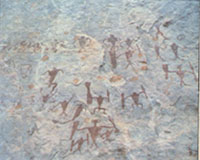The history of the Olympic Movement may be divided into the ancient and modern periods. The ancient period covered at least 12 centuries from 776 BC when the first Olympic Games was held in Greece to AD 339 when the Roman emperor Theodosius the Great prohibited the Olympic Games as a pagan activity. Then came a lull of some 15 centuries in which no Olympic Games were held, though the ancient Olympic ideals had not perished from the mind of many a great thinker. The modern period has covered less than one century, starting from 1896 when the first modern Olympic Games was held -- on an international rather than national scale.

Chronologically, the ancient period of the Olympic Movement corresponded in Chinese history to the period from the Eastern Zhou Dynasty (770-256 BC) to the Jin Dynasty (265-240 AD), while the modern period corresponded to the period from the latter part of the region of Guang Xu (1875-1909) of the Qing Dynasty to the present-day People's Republic of China. In the ancient period, China had no relations with Greece in the field of sport, although there was the Silk Road serving as a channel of trade and cultural exchanges between the East and West from the second century BC. In the modern period, however, China has been associated very early with the Olympic Movement. Such a relationship is more or less rooted in the common origin and features shared by ancient China and Greece in the field of sport, which forms part of national culture and is inseparable from socio-political life -- for all social communities at all times.
The ancient Olympic Games were a four-yearly event with sporting activities as its main content and the cessation of hostilities among the city states in Greece as its main characteristic. In those days, China also experienced divisions from time to time. There were the Spring and Autumn Period (770-476 BC) and the Period of Warring States (475-221 BC) during the Zhou Dynasty before the First Emperor of Qin (259-210 BC) unified the whole Chinese empire. Following the Han Dynasty (206BC-AD220), the main part of China was divided again during the Period of Three Kingdoms (220-280), to be reunified under the Jin court. As in ancient Greece, there were of course intervals of peace between wars among the states or kingdoms---not as a result of the proclamation of truce during the Olympic Games which were non-existent in ancient China, but as a result of diplomatic manoeuvres or military deterrent forces. After all, there is the universal law of "split after long unity and unity after long split," as Chinese philosophers put it.
However, the non-existence of Games does not necessarily mean non-existence of sports. As a matter of face, there are sports whenever and wherever there are human activities. Man must take up sports to keep fit for survival and amuse themselves after work. In order to gather food , hunters in the palaeolithic times not only invented tools, such as stone axes, balls, hooks, spearheads and nets, but also learned how to use them more efficiently, knowing that only with a stronger physique and the ability to run and swim faster, jump higher and throw a projectile farther and with greater precision could they catch more game and fish. This was the origin of the running, jumping, throwing and swimming events which figure so largely in the Olympic Games today, and whose origin can only be attributed to human instincts rather than to a particular race or individual at a particular time. The stone balls excavated in Gaoyang County in China's Shanxi Province date back to 100,000 years and are supposed to have been used not only in hunting, but also in throwing contests as athletes do in shot putting today. Archery, another Olympic event, has appeared in the mythology of many nations. Odyssey was said to have slain his wife's suitors with his bow and arrows. A Chinese legend has it that during the Yao times many thousand years ago, a marksman named Hou Yi shot down nine of the 10suns in the sky which had scorched all plants on the earth. Even today, bows and arrows are still used among many ethnic groups in China as a weapon to kill animals and in archery as a popular sporting event.
